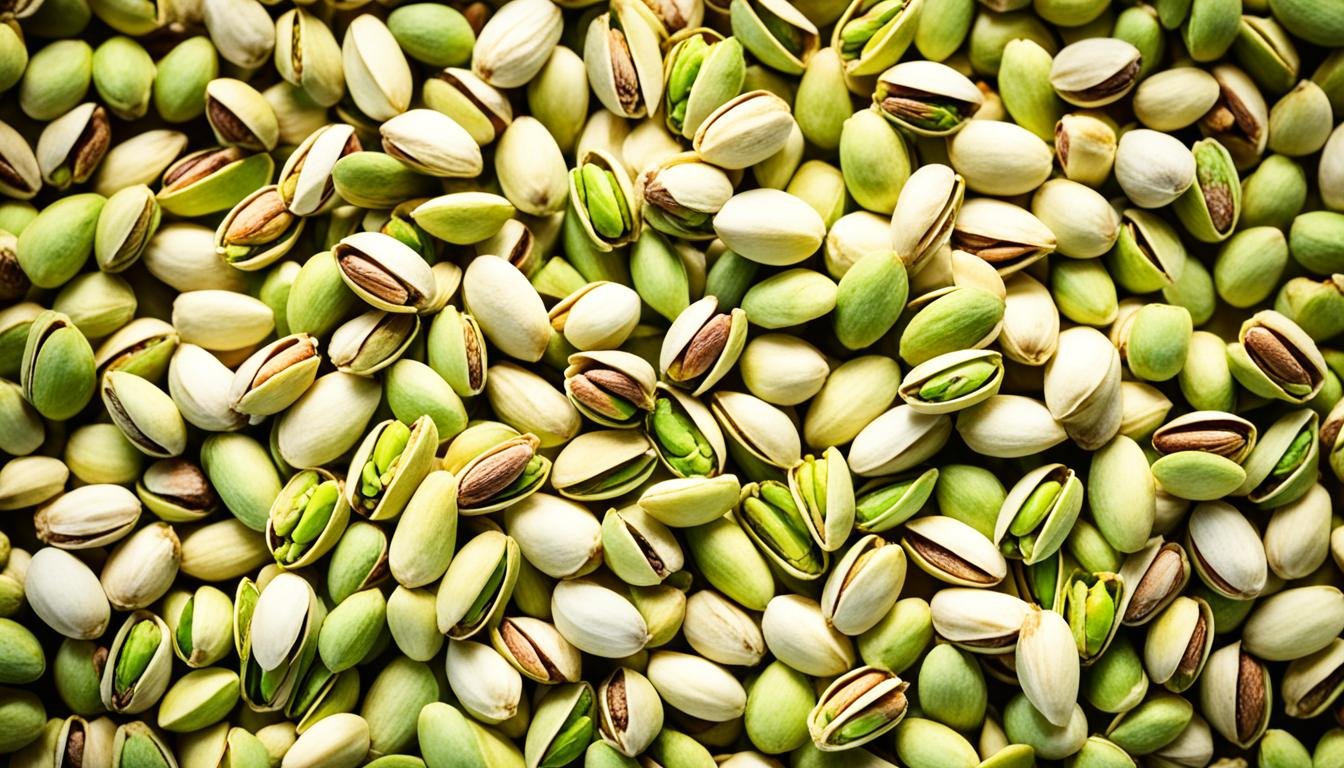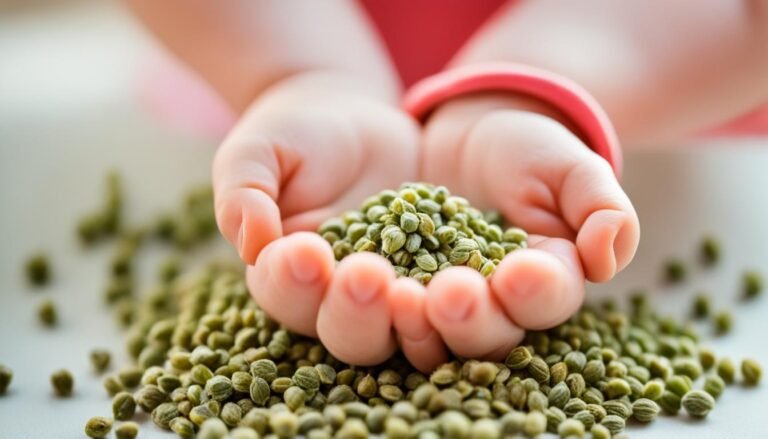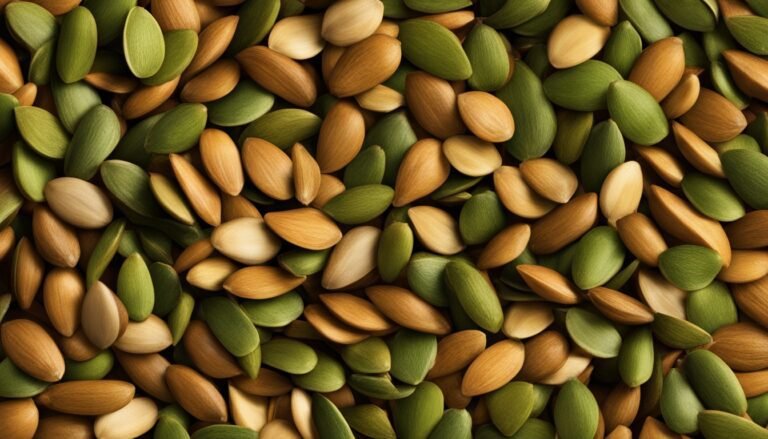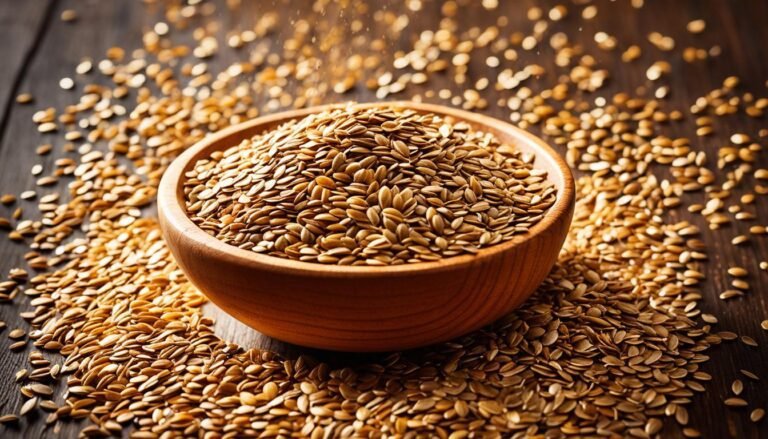Discover the Amazing Health Benefits of Pistachios

Did you know a 1-ounce serving of pistachios has 160 calories, 6 grams of protein, and 3 grams of fiber? These snacks are packed with nutrients that support your health. They help with heart health and weight management.
Pistachios come from the pistachio tree and are green with a sweet taste. They are actually seeds, not nuts. California, Arizona, and New Mexico produce all of America’s pistachios. You can find them in most stores, shelled or unshelled, roasted, or salted.
Pistachios are full of 20% protein and have a high calorie-to-protein ratio. They also have lots of antioxidants, second only to walnuts and pecans. These nuts are rich in unsaturated fats and potassium, which are good for your health.
Eating pistachios can help with many health issues. They support healthy gut bacteria, lower blood pressure and cholesterol, and keep blood sugar levels healthy. They also improve blood vessel health, eye health, and can help with weight loss.
What Are Pistachios?
Origin and Cultivation
Pistachios come from the Pistacia vera tree, found in the Middle East. Countries like Syria, Afghanistan, Iran, and Greece are home to this tree. After World War II, the US started growing them in California, New Mexico, and Arizona.
Now, the US is a big producer and exporter of pistachios. Pistachios come in different types, like shelled, unshelled, salted, or roasted. People enjoy them as snacks and use them in many recipes.
The pistachio tree is tough and can handle dry, warm weather. It takes 7-10 years to start producing nuts. These trees can live for decades, giving a lot of nuts every year.
Pistachios are famous for their green color and sweet, nutty taste. In recent years, growing and making pistachios has become more popular. This makes them a favorite nut around the world.
Nutritional Value of Pistachios
Pistachios are a super nut, full of important vitamins, minerals, and nutrients. A single 1-ounce (28-gram) serving of pistachios has:
- 159 calories
- 8 grams of carbohydrates
- 3 grams of fiber
- 6 grams of protein
- 13 grams of fat
Pistachios are loaded with key nutrients like:
- Potassium (6% of the Daily Value)
- Phosphorus (11% of the Daily Value)
- Vitamin B6 (28% of the Daily Value)
- Thiamine (21% of the Daily Value)
- Copper (41% of the Daily Value)
- Manganese (15% of the Daily Value)
Pistachios are among the top foods for vitamin B6. This vitamin helps control blood sugar and makes hemoglobin. Pistachios are a great snack because of their mix of nutrients, vitamins, and minerals.

Pistachio Benefits
Antioxidant Properties
Pistachios are known for their high antioxidant levels, making them a top choice among nuts. They are packed with lutein and zeaxanthin. These are key antioxidants that protect the eyes from blue light damage and age-related eye diseases.
Pistachios also have polyphenols and tocopherols, important antioxidants. These can help fight cancer and heart disease by neutralizing harmful free radicals and lowering oxidative stress.
The antioxidants in pistachios are easy for the body to use, thanks to their bioavailability. This means you can get the most out of these powerful compounds. They support your health and overall well-being.
- Pistachios are among the most antioxidant-rich nuts available.
- They are especially high in lutein and zeaxanthin, crucial antioxidants for eye health.
- Pistachios also contain abundant polyphenols and tocopherols, which may help protect against cancer and heart disease.
- The antioxidants in pistachios are highly bioavailable, meaning they are easily absorbed by the body.
Heart Health Benefits
Eating pistachios can be good for your heart. Studies show they can lower cholesterol. Adding pistachios to your meals or snacks can help lower bad cholesterol and raise good cholesterol.
Pistachios also help with blood pressure. A review of 21 studies found they lowered blood pressure by a bit. This can help prevent heart disease.
A diet with pistachios can cut down heart disease risk by 30%. Pistachios and other nuts can lower bad cholesterol. This reduces the risk of heart disease.
Adding pistachios to your diet is a step towards better heart health. They are full of antioxidants and healthy fats. These make pistachios a great choice for a healthy diet.
Protein-Rich, Low-Calorie Snack
Pistachios are a great choice for healthy snacking. They are full of pistachio protein content and have a good pistachio calorie density. This makes them a perfect pistachio as a healthy snack.
A 1-ounce (28-gram) serving of pistachios has 6 grams of protein. This is more protein than many other nuts. For example, almonds have 7 grams of protein in a 1/4-cup (35-gram) serving. Walnuts offer 4.5 grams per 1/4-cup (29-gram) serving, and cashews give you 5 grams per 1/4-cup (32-gram) serving.
Pistachios are also low in calories. A 1-ounce (28-gram) serving has only 159 calories. This makes them a great choice for those watching their calorie intake. Their high protein and low calories can help you feel full, which is good for weight management.
If you want a snack that’s both tasty and healthy, try pistachios. They’re perfect for a mid-afternoon snack or as part of a balanced diet. Their crunchy texture and savory taste are hard to beat.

Remember, it’s important to enjoy pistachios in moderation. Adding them to your diet in the right amounts can help you get the most out of their nutritional benefits.
Cholesterol-Lowering Effects
Studies show that eating pistachios can lower your cholesterol. By swapping some meal calories with pistachios, you can lower your total and LDL (bad) cholesterol. At the same time, you’ll see an increase in your HDL (good) cholesterol.
A study found that eating 20% of your calories from pistachios cut LDL cholesterol by 12%. Another study showed that pistachios in a Mediterranean-style diet lowered LDL cholesterol by 23%. It also reduced total cholesterol by 21% and triglycerides by 14%. These changes can lower your risk of heart disease.
Optimizing Your HDL and LDL Cholesterol
Pistachios can help both HDL and LDL cholesterol levels. Eating 3 ounces of pistachios daily can increase HDL cholesterol by 15% in a month. They also help lower LDL cholesterol and triglycerides, but the effect on HDL is bigger.
Eating pistachios as 20% of your calories can improve your cholesterol and waist size, and lower blood sugar. This was seen in a 24-week study. Even though pistachios are high in calories, the study found no significant weight gain.
Pistachios’ ability to lower cholesterol comes from their nutrient-rich profile. They are full of thiamin, potassium, phytosterols, magnesium, vitamin B6, fiber, and healthy fats. These nutrients help improve cholesterol levels and support heart health.
Skin Health Benefits
Pistachios are great for your skin. They are full of vitamins, minerals, antioxidants, and other good stuff. Eating pistachios can make your skin look better.
Pistachios have lots of antioxidants. These include vitamin E and carotenoids. These help protect your skin from damage that can cause wrinkles, spots, and uneven skin tone.
- Pistachios help protect your skin from the sun, thanks to their vitamin E and antioxidants. You can use pistachio oil as a natural sunscreen to keep your skin safe from UV rays.
- They also have anti-inflammatory properties. This means they can calm your skin, reducing redness and irritation. They’re perfect for sensitive or acne-prone skin.
- Pistachios are packed with vitamins and minerals like vitamin B6 and biotin. These support healthy skin cells, hair, and nails.
Adding pistachios to your daily meals can make your skin glow. It helps keep your skin looking young and healthy.

Blood Sugar Regulation
Pistachios are a great choice for those wanting to keep their blood sugar stable. They have a low glycemic index, which means they don’t cause blood sugar spikes. This makes them perfect for people with diabetes, helping to keep blood glucose steady.
Pistachios are packed with dietary fiber, which slows down the digestion of carbs. This helps prevent sudden blood sugar spikes. They also have healthy fats, protein, and important vitamins and minerals. These nutrients support your metabolic health.
Studies show that eating pistachios is good for people with diabetes or at risk of it. Adding pistachios to your meals can help control blood sugar and lower the risk of complications.
| Nutrient | Amount per 1 oz (28g) serving of pistachios |
|---|---|
| Calories | 159 |
| Total Fat | 13g |
| Carbohydrates | 8g |
| Fiber | 3g |
| Protein | 6g |
| Glycemic Index | Low (GI of 14) |
Eating pistachios is a tasty way to manage your blood sugar and support your health. They’re a great choice for preventing or managing diabetes. Pistachios are versatile and can be a part of a healthy diet.
Digestive Health Benefits
Pistachios are tasty and great for your gut health. They are full of fiber, which is key for a healthy gut. A single ounce of pistachios gives you 3 grams of fiber, making them a top choice for gut health.
The fiber in pistachios helps the good bacteria in your gut. This fiber turns into short-chain fatty acids, like butyrate. These acids can lower the risk of digestive problems, cancer, and heart disease. Studies show pistachios boost butyrate-producing bacteria more than almonds do, showing their gut health benefits.
Promoting Beneficial Gut Bacteria
Pistachios are not just high in fiber. They also have antioxidants, vitamins, and minerals that help the good bacteria in your gut. Eating about 85 grams of pistachios daily can change your gut bacteria for the better in just 19 days.
By supporting good gut bacteria, pistachios can improve digestion, nutrient absorption, and immune health. Remember, 95% of the feel-good hormone serotonin is produced in the intestine, and the gut is home to about 70% of the cells that make up the immune system. Adding pistachios to your diet can greatly improve your health.
| Pistachio Benefits for Gut Health | Key Findings |
|---|---|
| High in Fiber | A 1-ounce serving of pistachios contains 3 grams of fiber, making them a great prebiotic food. |
| Promote Beneficial Gut Bacteria | Consuming about 85 grams of pistachios per day can lead to positive changes in gut bacteria levels within 19 days. |
| Boost Short-Chain Fatty Acids | The fiber in pistachios is converted into short-chain fatty acids, such as butyrate, which have been linked to a reduced risk of digestive disorders and other health benefits. |
| Support Immune System and Serotonin Production | The gut is home to 70% of the immune system cells and 95% of serotonin production, so a healthy gut can have far-reaching effects on overall well-being. |
If you want to boost your digestive health and overall well-being, try eating more pistachios. They’re full of fiber, prebiotics, and other good stuff for your gut.

Pistachio Benefits for Eye Health
If you’re looking to support your eye health, pistachios are a great choice. These nuts are packed with lutein and zeaxanthin. These are key for keeping your vision sharp.
Lutein and zeaxanthin shield the eyes from blue light and fight age-related macular degeneration (AMD), a big cause of vision loss. Eating pistachios can also cut down the risk of cataracts and protect eye muscles from sun damage.
For older adults, adding pistachios to their diet is a smart move. They help prevent eye problems and keep vision clear. Carotenoids in pistachios guard against cataracts, common in older folks. Eating these nuts can also reduce retina damage as you age.
Pistachios are also full of vitamin E, which lowers the risk of cataracts and AMD. Plus, their monounsaturated fats help your body absorb carotenoids better. This boosts their eye health benefits.
So, eating more pistachios is a good way to keep your eyes healthy and clear. With their powerful nutrients, these tasty nuts can help you see well for years.

Weight Management Aid
Pistachios can be a great addition to your weight management plan. They are full of protein and fiber. These nutrients help you feel full and satisfied. This can lead to eating fewer calories and supporting weight loss.
Studies show that eating in-shell pistachios can help you eat fewer calories. This is because they take more time and effort to crack open. The shells also help you keep track of how much you’ve eaten, promoting mindful eating and portion control.
Research suggests that eating 1.5 ounces of pistachios daily can help you lose 5% of your body weight over 4 months. Adding pistachios to a weight loss program can also lead to a healthier weight and lower blood pressure.
Pistachios are also low in calorie density. This means they offer a satisfying crunch without adding extra pounds. Their fiber and protein content make you feel full for longer. This can reduce the urge to snack on less healthy foods.
To get the most out of pistachios for weight management, practice portion control. Consider buying them in-shell or pre-portioned to avoid overeating. Enjoying pistachios as part of a balanced, calorie-conscious diet can help you on your path to a healthier lifestyle.
Incorporating Pistachios into Your Diet
Pistachios are a versatile and nutritious ingredient. They can be easily added to your daily meals and snacks. From breakfast to dessert, these nuts offer a crunchy texture and a boost of vitamins, minerals, and antioxidants.
Pistachio-Based Meals and Snacks
Start your day with pistachios on your yogurt, cereal, or oatmeal. Add them to salads, pasta dishes, or Middle Eastern-inspired platters for a delightful crunch. Enjoy pistachios on their own, with dried fruit and other nuts, or blended into homemade granola or nut butters.
When cooking, pistachios can add texture and flavor to your dishes. Blend them into hummus, sprinkle on grain bowls, or use as a crunchy topping for roasted vegetables and other savory meals.
For sweet treats, use pistachios in baked goods like cookies, muffins, or pistachio meal ideas. Try pistachio-crusted cheesecake or pistachio ice cream. The possibilities are endless with how to eat pistachios and pistachio recipes.
Adding pistachios to your daily routine is an easy way to enjoy their health benefits. It also adds a delicious crunch to your meals and snacks.
Moderation is Key
Pistachios are great for your health, but don’t eat too many. They are high in calories, so eating a lot can make you gain weight. It’s best to stick to a pistachio serving size of 1-2 ounces, or about 30-49 kernels, each day.
Some people might have issues with pistachios, like getting too much sodium from salted ones, stomach trouble because of their FODMAP content, or allergies. If you’re thinking about adding pistachios to your diet, talk to a doctor. They can give you the right advice on how many to eat based on your health needs and goals.
| Nutrient | Serving Size (1 oz, about 49 kernels) |
|---|---|
| Calories | 160 |
| Total Fat | 13 g |
| Saturated Fat | 2 g |
| Protein | 6 g |
| Carbohydrates | 8 g |
| Fiber | 3 g |
| Sodium | 0 mg (unsalted) |
Pay attention to how much pistachio serving size you eat and watch for any side effects. This way, you can enjoy pistachios’ health perks without overdoing it. This keeps your diet balanced and healthy.
Pistachio Benefits
Pistachios are a nutritional powerhouse, packed with health benefits. They are full of vitamins, minerals, antioxidants, and more. These nutrients support your overall health.
A 30g serving of pistachios is rich in protein, healthy fats, fiber, and important nutrients like potassium and iron. Pistachios are also high in antioxidants. These compounds help fight off harmful free radicals and reduce stress in the body.
Adding pistachios to your diet has many health perks. They can improve heart health, manage cholesterol, and help keep blood sugar stable. They also support digestion, eye health, and can help with weight management.
Pistachios are good for your gut thanks to their fiber and gut-friendly bacteria. They also have melatonin, which can help with sleep and relaxation.
But, eat pistachios in moderation to avoid weight gain or allergic reactions. By adding pistachios to your meals and snacks, you can enjoy their taste and get many health benefits.
| Nutrient | Amount per 30g Serving |
|---|---|
| Calories | 169 kcal/706 kJ |
| Protein | 6.1 g |
| Fat | 13.6 g |
| Saturated Fat | 1.7 g |
| Monounsaturated Fat | 7.1 g |
| Polyunsaturated Fat | 4.1 g |
| Carbohydrates | 5.4 g |
| Fiber | 3.1 g |
| Potassium | 308 mg |
| Iron | 1.18 g |
| Vitamin E | 1.37 mg |
Conclusion
Pistachios are a great choice for anyone looking to improve their health. They help with heart health, digestion, and weight control. Adding pistachios to your meals is easy and tasty.
These nuts are packed with protein, fiber, and antioxidants. They also have essential vitamins and minerals. This makes them a key part of a healthy diet.
Studies show that pistachios have many health benefits. They can lower the risk of heart disease and help manage blood sugar. They also aid in weight control and boost brain function.
Pistachios are full of good fats, fiber, and plant compounds. These compounds protect against harmful free radicals.
Enjoying pistachios in moderation can greatly benefit your health. You can add them to meals, snacks, or eat them on the go. Pistachios are a delicious way to support your health. So, consider making pistachios a regular part of your diet.
FAQ
What are the health benefits of pistachios?
Pistachios are great for your heart and help with weight control. They also help manage blood sugar, improve digestion, and protect your eyes. Plus, they’re full of antioxidants.
Are pistachios a good source of protein?
Yes, pistachios are packed with protein. A 1-ounce serving has about 6 grams of protein. This makes them a top choice for plant-based protein.
How do pistachios affect cholesterol levels?
Studies show pistachios can lower cholesterol. Eating pistachios instead of other snacks can lower bad cholesterol and raise good cholesterol.
Are pistachios good for skin health?
Yes, pistachios are good for your skin. Their antioxidants and anti-inflammatory properties improve skin tone and prevent acne.
Can pistachios help regulate blood sugar levels?
Pistachios help control blood sugar thanks to their low glycemic index and fiber. These nutrients prevent blood sugar spikes, making them great for diabetics.
How do pistachios benefit digestive health?
Pistachios are full of fiber, which feeds good gut bacteria. This fiber can lower the risk of digestive problems and diseases.
What are the eye health benefits of pistachios?
Pistachios boost eye health with antioxidants like lutein and zeaxanthin. These protect eyes from blue light damage and prevent age-related vision loss.
Can pistachios aid in weight management?
Pistachios are good for weight control because of their protein and fiber. These nutrients make you feel full, helping you eat less and lose weight.
How can I incorporate pistachios into my diet?
You can add pistachios to many foods like breakfast dishes, salads, and snacks. Blend them into hummus or use as a topping for grain bowls.
How much should I consume pistachios?
Enjoy pistachios in moderation because they’re calorie-dense. Aim for 1-2 ounces a day. A healthcare professional can guide you on the right amount for your health goals.






